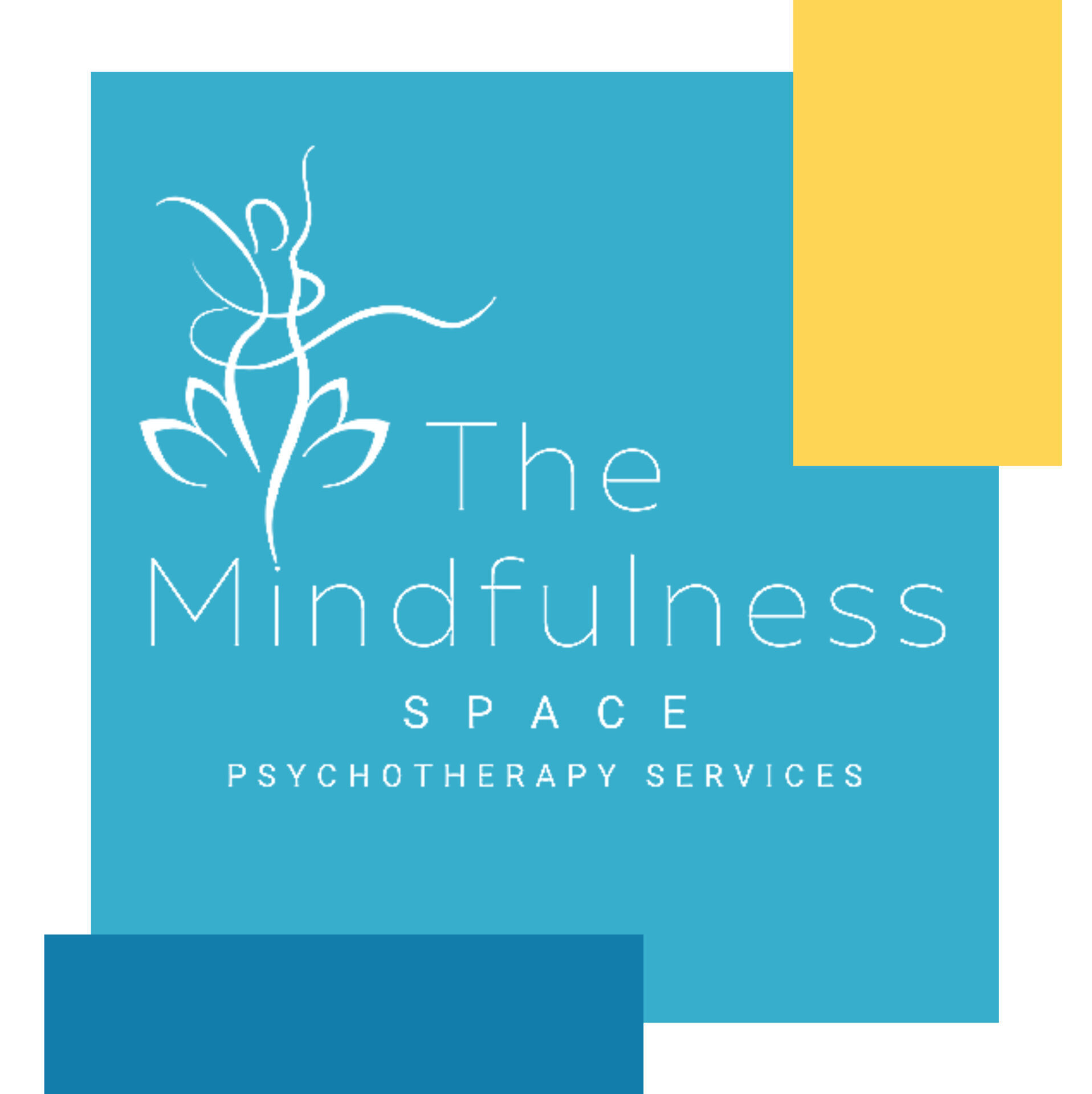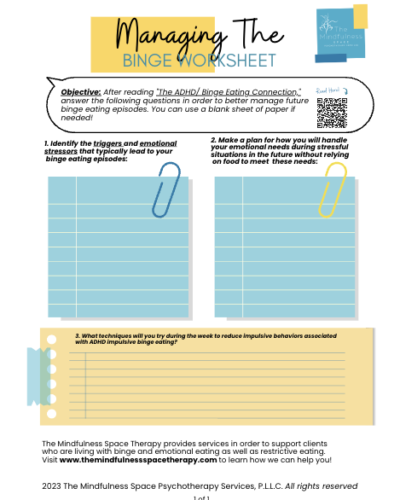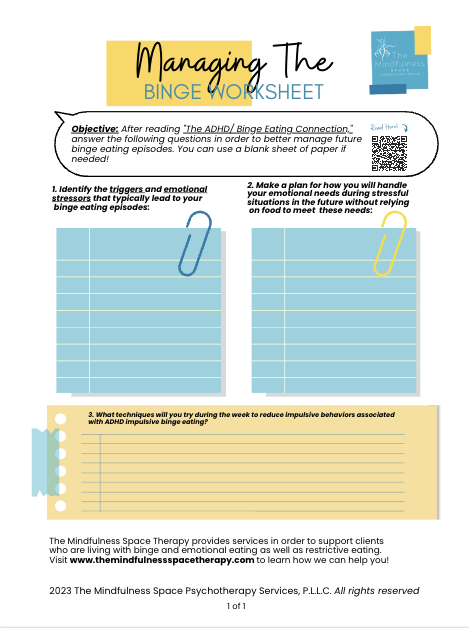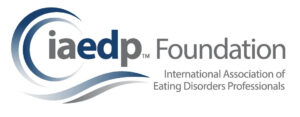Impulsive Over Eating: The ADHD/ Binge Eating Connection
Did you know that there may be a connection between ADHD and binge eating?
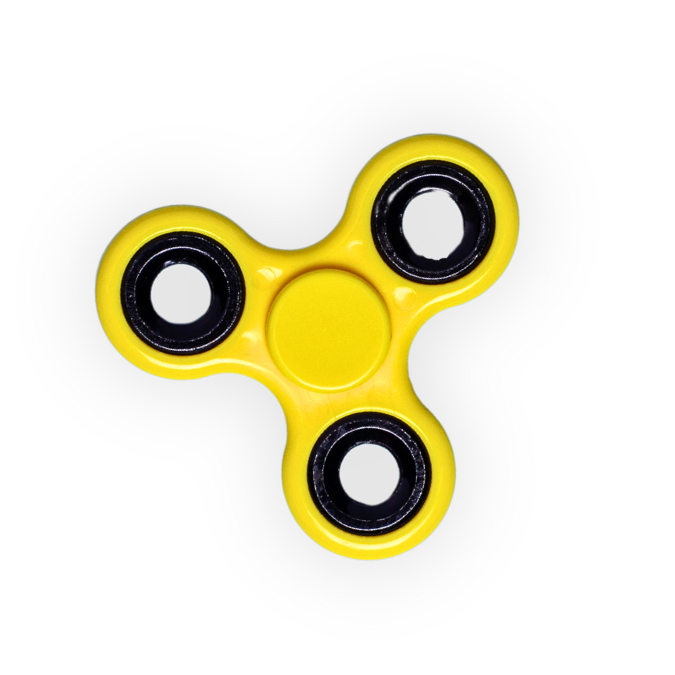
April 22, 2023
Stefanie M. Lawson, MSW LCSW
The Mindfulness Space Psychotherapy Services, PLLC
Attention Deficit Hyperactivity Disorder or ADHD is a mental health disorder that affects millions of people worldwide. Individuals with ADHD may experience difficulties with focus, concentration, and impulsivity. However, research has shown us that there may be a connection between ADHD and binge eating.
Compulsive and impulsive behaviors are common in disorders such as Binge Eating Disorder, Bulimia Nervosa, and Anorexia Nervosa-Binge Eating/Purging type. Studies suggest that the impulse control deficits that are present in ADHD may also play a role in these eating disorders.

The Research:
In one study, researchers found that girls with ADHD were 3.6 times more likely to have an eating disorder than girls without ADHD and 5.6 times more likely to have Bulimia Nervosa.
Another study found that Binge Eating Disorder was frequently co-morbid with ADHD, and ADHD has also been linked to a loss of control eating.
If you are struggling with binge eating related to stress and impulse control associated with ADHD, here are some tips that may help:
- Identify Your Triggers: The first step to managing binge eating is to identify the triggers that lead to this behavior. These triggers could be emotions such as stress, loneliness, boredom, or feeling overwhelmed. By identifying your triggers, you can be more aware of situations that may cause you to binge eat and take steps to manage them.
- Plan Ahead: Once you have identified your triggers, make a plan for how you will handle your emotional needs during these situations without completely relying on food to meet your emotional needs. For example, if stress is a trigger, plan to go for a walk or practice deep breathing exercises instead if your body isn’t hungry. It’s important to note that food is not the enemy and we should all have healthy relationships with food. However, when we rely on food to meet most of our emotional needs, we may be suppressing the real underlying causes of our emotions.
@themindfulnessspace Did you know that there may be a connection between ADHD and uncontrollable/ impulsive eating? Let’s talk about it and watch until the end because I’m gonna give you 3 tips to help you manage both! ##adhdtips##emotionaleatinghealing##fooddisorderawearness##psychotherapist##lcsw ♬ Da Girls - Ciara

3. Use Mindfulness and Relaxation Techniques: Mindfulness, attuned or intuitive eating, relaxation techniques, or vagus nerve stimulation can be helpful tools in being more aware of your body’s needs and managing impulsive behaviors. When you feel the urge to binge eat, try to pause and take a few deep breaths. Ask yourself if you are truly hungry or if there is an emotional need that you are trying to fulfill. By being more mindful of your body’s needs, you can develop a healthier relationship with food and improve your overall well-being.
What is Mindfulness?
Mindfulness is the practice of being present and fully engaged in the current moment, without judgment. It involves being aware of, but not judging your thoughts, feelings, and bodily sensations, as well as your environment. This can be helpful because judging or examining our already stressful and unhelpful thoughts usually leads to more stress, negative feelings and emotions, or worsening behaviors. Using the nonjudgmental component of mindfulness prior to a binge eating episode, can help us to reduce acting on negative thoughts feelings and emotions, such as using food in order to self-regulate or self-soothe our emotions.
Mindfulness can be useful for ADHD as it helps individuals develop greater awareness of their thoughts, feelings, and bodily sensations, which can improve impulse control, attention, and emotional regulation.
What is Intuitive Eating?
Intuitive eating is an approach to eating that involves listening to your body’s internal signals of hunger and fullness and making food choices based on these internal cues rather than external factors that are driven by stress and unpleasant feelings or emotions that may lead to binge eating.
Intuitive eating combined with the use of relaxation techniques can be helpful for reducing binge eating because relaxation skills disrupt the body’s natural stress response (I’ll talk more about this next.) teaches us to eat by being more in tune with our bodies natural hunger and fullness cues, thus learning to only eat until we are satiated.

What are Relaxation Techniques?
Relaxation techniques can be used to decrease stress, anxiety, and tension in the body and mind by disrupting the body’s stress or “fight or flight” response. Using relaxation can be helpful for both binge eating and ADHD, as they can also help regulate emotions and reduce impulsive behaviors.
By engaging in relaxation techniques, individuals can calm their nervous system, increase feelings of relaxation, and reduce the urge to engage in binge eating or impulsive behaviors.
Belly Breathing!
One example of a relaxation technique that can be helpful for binge eating and ADHD is diaphragmatic or belly breathing. Belly breathing involves taking slow, deep breaths from the stomach, not the chest, focusing on the inhale and exhale, and slowing the heart rate.
By practicing deep breathing, individuals can increase their awareness of their breathing patterns, reduce tension in the body, and increase feelings of relaxation, thus reducing impulsive behaviors.
Try This Exercise Now:
Placed one hand over your stomach, and another hand over your chest. While keeping your chest as still as possible, breathe in slowly and deeply from your stomach, feeling the hand placed on top of your stomach move as your stomach expands with air.
Breathing slowly and deeply, try to expand your stomach as much as possible while keeping the hand over your chest completely still.
As you continue to breathe from your belly, notice the feeling of the air as it flows in and out. Practice this exercise until your body begins to feel more relaxed.
What are Polyvagal Exercises?
Polyvagal exercises are techniques that help regulate the body’s autonomic nervous system, AKA the sympathetic and parasympathetic nervous systems. The sympathetic nervous system is what prepares our body for the “fight or flight” response as a result of encountering stressors. The parasympathetic nervous system helps our body to “calm down” from that response. Polyvagal exercises work by specifically stimulating the vagus nerve. The vagus nerve plays a crucial role in regulating many body functions, including heart rate, digestion, and breathing.
Polyvagal exercises can be used to activate the vagus nerve’s calming response in order to promote relaxation, reduce stress and reduce anxiety.
There is some research, notably that of Dr. Stephen Porges that polyvagal exercises can help to regulate the state of behavioral and physiological dysregulation associated with ADHD.

For binge eating, practicing polyvagal exercises can help individuals become more attuned to their bodily sensations and emotions, thus being better equipped to self-regulate and manage stressors that trigger impulsive behaviors, such as binge eating.
Examples of Common Polyvagal Exercises Include:
- Diaphragmatic breathing or belly breathing (see above)
- Singing or listening to relaxing music
- Practicing yoga
- Dancing or gentle body movement
Overall, managing binge eating related to ADHD involves being aware of your triggers, developing a plan to manage your emotional needs, and using mindfulness, attuned eating and relaxation techniques to manage impulsive behaviors. It’s important to remember that seeking support from a licensed therapist or healthcare provider can also be a helpful step in managing these behaviors.
Do you Struggle with Uncontrollable Binge or Emotional Eating?
If you are struggling with uncontrollable emotional or binge eating, it’s important to seek help from a licensed therapist or healthcare provider. Stefanie Lawson is a licensed therapist and owner of The Mindfulness Space therapy in Greensboro, NC who specializes in treating eating disorders, body image dissatisfaction, as well as stress and anxiety that may lead to uncontrollable and impulsive emotional eating in adults ages 18 and older, as well as transitional aged teens. Schedule your free 30 minute call with The Mindfulness Space today to learn more about how Stefanie can help you!
Still want to learn more? Read: Cracking the Code: How Behavior Chain Analysis Can Help You Overcome Binge Eating and HAES Informed Psychotherapy and Intuitive Eating Informed Skills Training in Greensboro North Carolina
References:
Cortese S, Isnard P, Frelut ML, et al. Association between symptoms of attention-deficit/hyperactivity disorder and bulimic behaviors in a clinical sample of severely obese adolescents. Int J Obes (Lond) 2007;31(2):340–6.
Mattos P, Saboya E, Ayrao V, Segenreich D, Duchesne M, Coutinho G. Comorbid eating disorders in a Brazilian attention-deficit/hyperactivity disorder adult clinical sample. Rev Bras Psiquiatr. 2004;26(4):248–50.
Reinblatt SP, Mahone EM, Tanofsky-Kraff M, et al. Pediatric loss of control eating syndrome: association with attention-deficit/hyperactivity disorder and impulsivity. Int J Eat Disord. 2015;48(6):580–8.
Reinblatt SP, Are Eating Disorders Related to Attention Deficit/Hyperactivity Disorder? National Library of Medicine; National Center for Biotechnical Information; www.ncbi.nlm.nih.gov/pmc/articles/PMC4777329/
Your Next Step...
Take your next step with The Mindfulness Space!
Schedule your free 30 minute consultation today!
Sign up for our Newsletter!
Are you a provider? Join the email list to sign up for our newsletter today! By signing up, you agree to join The Mindfulness Space’s email list and receive periodic communication with us via newsletter. (See website privacy and terms of use here.) Don’t worry, we won’t spam your inbox! Sign up today! Sign up here!
